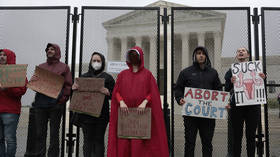The Roe v Wade decision is not about abortion. It’s about preserving a republic

While feminists and left-wing activists nationwide decry the leaked Roe v. Wade Supreme Court decision draft as an attack on women’s rights, the real issue is not about women or even about abortion. What happens next with Roe v. Wade could help steer the US back toward what the founding fathers intended – a Court that keeps majoritarianism in check as it upholds the Constitution.
When debating issues such as Roe v. Wade, it is important that we all first and foremost understand that America is a constitutional republic, not a democracy. In a democracy, the minority of a population are always subject to majority rule – no matter how morally bankrupt that majority may be or may become. The founders feared that very scenario, and thanks to the wisdom and foresight of men like James Madison, our system of government doesn’t function that way. Instead, we have a system of checks and balances under republican governance, where the minority is not at the mercy of the majority. Over time, this essential characteristic of our government has been diluted and sometimes outright ignored, as with the original Roe v. Wade decision. If the judges in 1973 had respected the role of the Court in relation to the Constitution, abortion law would have stayed at the state level. For a small group of judges to make Roe’s case the law of the land, was, in fact, anti-Constitutional.
Nearly fifty years later, the Supreme Court has decided to reverse this bad decision based on these exact constitutional grounds. Of course, the social consequences of righting such a wrong will be further civil unrest. America is already a very divided country, and our political and cultural division has put increasing pressure on state governors and legislators to use their full constitutional powers. I believe this is for the best in the long term, as it will decentralize some of the federal powers that never should have been established. What’s unfortunate is that it has to happen over a hot-button cultural issue. Protest fatigue is real.
Depending on which side of the abortion debate you’re on, you might be happy or angered by California Governor Newsom’s emotional vow to make his state more abortion-friendly than ever before. By contrast, the more conservative-leaning states will likely greatly restrict or outright ban abortions. But both of those scenarios represent exactly the way our system is meant to work. Because the US is a large and religiously diverse country, and thus encompasses an array of personal beliefs, inflammatory issues such as abortion are usually best decided at the state level. James Madison described this in Federalist 10 when he wrote:
“The influence of factious leaders may kindle a flame within their particular States, but will be unable to spread a general conflagration through the other States. A religious sect may degenerate into a political faction in a part of the Confederacy; but the variety of sects dispersed over the entire face of it must secure the national councils against any danger from that source.
Thus, we have state laws and federal laws, but the ideal vision for America is for state law to govern citizen’s lives in most circumstances, not federal law.”
One of the great things about America is that if you don’t like the politics or laws of a particular state, you can get up and move. And we do. Since 2020, we’ve seen a steady migration of people moving to states that more closely align with their political, cultural, and world views. If this trend intensifies in the coming years, as we are simultaneously returning power back to the states, such as with the repeal of Roe v Wade, America will come to look very different even within one generation.
The knee-jerk reaction might be to presume that we will be an even more divided country than we are now, but in my view, limiting federal power will lead to peace and compromise nationwide.
Let’s not forget that once upon a time, ALL Americans – red, blue, and purple – believed in and wanted less government, not more. I could write a book about why we regressed, but what matters now is that we return to our heritage. We have a shot at doing just that with solutions such as the Convention of States. Under Article V of the US Constitution, such a convention can legally be called for the purpose of proposing amendments and limiting federal power. It would be a win-win for all Americans if at least thirty-four states came together to make it happen, and now would be the perfect time. Given the Biden administration’s push for more federal control, a Convention of States would help to counter some of the overreach.
As Americans, it seems, we are gradually waking up to realize that we’ve been sleeping passengers for far too long on a ship we are meant to steer.
The statements, views and opinions expressed in this column are solely those of the author and do not necessarily represent those of RT.














